Law and Legal System: Main Stages, Stakeholders, and Effectiveness
VerifiedAdded on 2023/01/11
|7
|2051
|83
AI Summary
This report examines the main stages of the criminal justice process, the role of stakeholders such as police, probation officers, and prison officers, and methods to measure the effectiveness of the process. It also explores how stakeholders work together to deliver justice and reduce reoffending activities. Case studies are included to illustrate these concepts.
Contribute Materials
Your contribution can guide someone’s learning journey. Share your
documents today.

LAW AND LEGAL SYSTEM
Secure Best Marks with AI Grader
Need help grading? Try our AI Grader for instant feedback on your assignments.
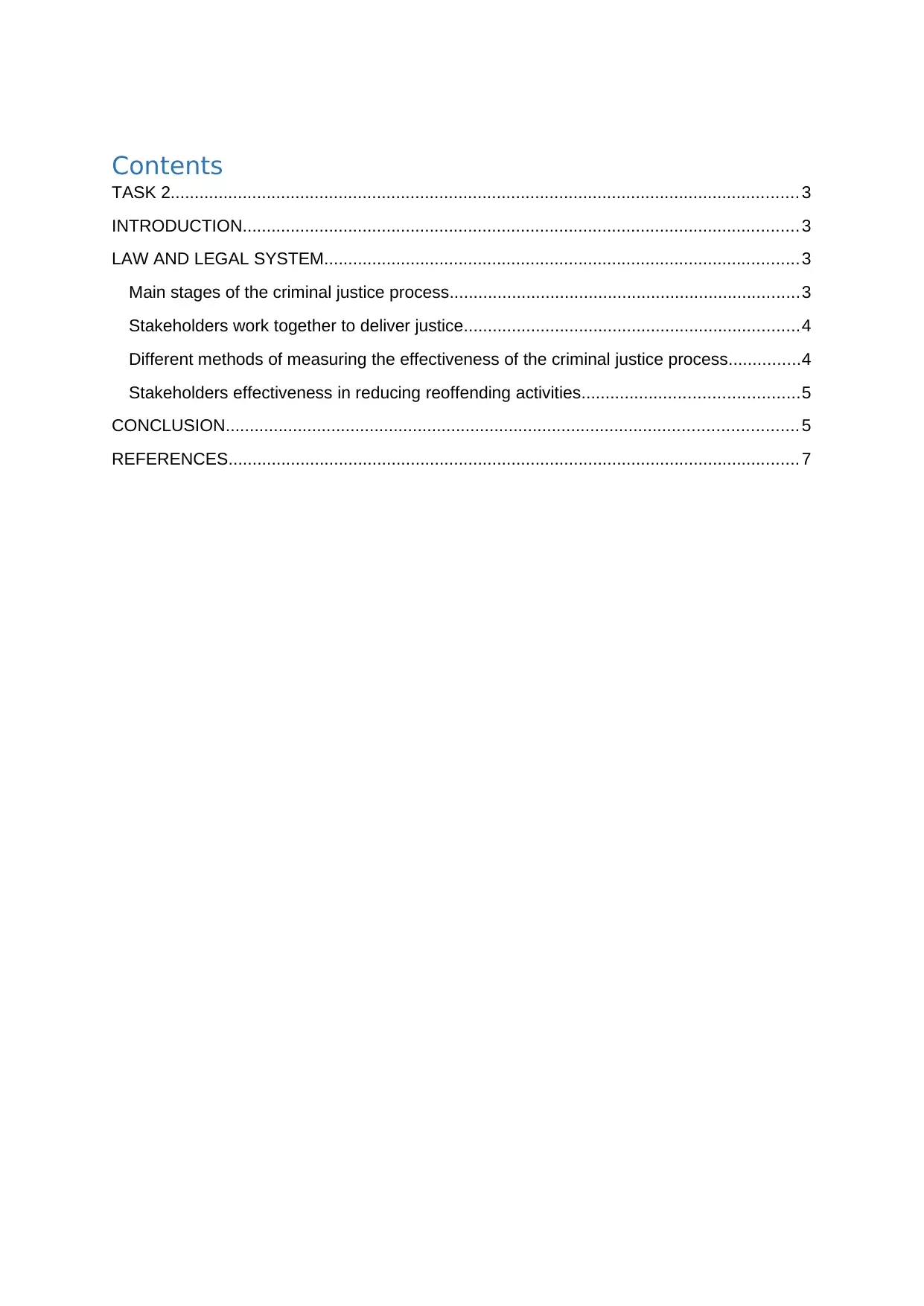
Contents
TASK 2................................................................................................................................... 3
INTRODUCTION.................................................................................................................... 3
LAW AND LEGAL SYSTEM...................................................................................................3
Main stages of the criminal justice process.........................................................................3
Stakeholders work together to deliver justice......................................................................4
Different methods of measuring the effectiveness of the criminal justice process...............4
Stakeholders effectiveness in reducing reoffending activities.............................................5
CONCLUSION....................................................................................................................... 5
REFERENCES....................................................................................................................... 7
TASK 2................................................................................................................................... 3
INTRODUCTION.................................................................................................................... 3
LAW AND LEGAL SYSTEM...................................................................................................3
Main stages of the criminal justice process.........................................................................3
Stakeholders work together to deliver justice......................................................................4
Different methods of measuring the effectiveness of the criminal justice process...............4
Stakeholders effectiveness in reducing reoffending activities.............................................5
CONCLUSION....................................................................................................................... 5
REFERENCES....................................................................................................................... 7
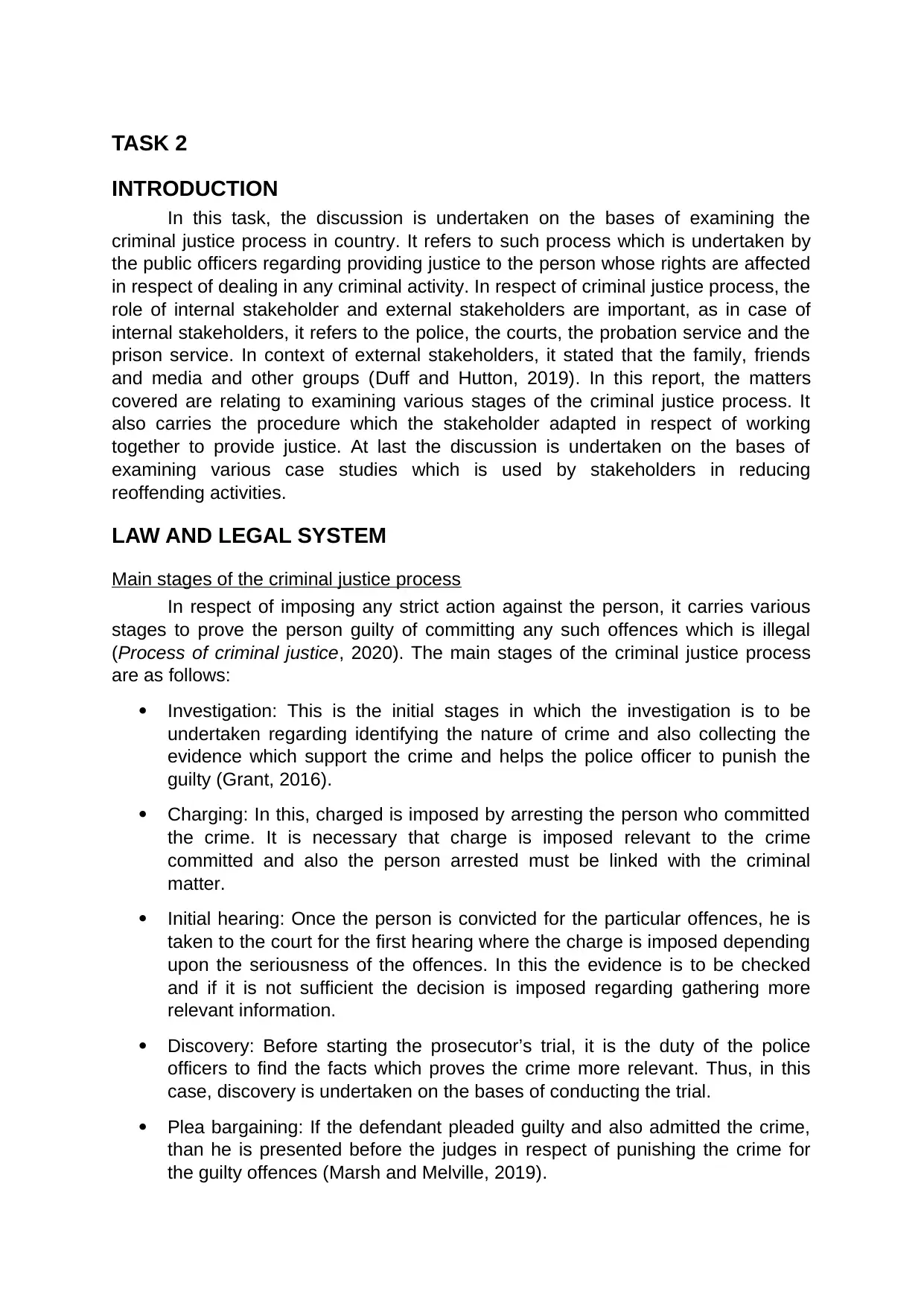
TASK 2
INTRODUCTION
In this task, the discussion is undertaken on the bases of examining the
criminal justice process in country. It refers to such process which is undertaken by
the public officers regarding providing justice to the person whose rights are affected
in respect of dealing in any criminal activity. In respect of criminal justice process, the
role of internal stakeholder and external stakeholders are important, as in case of
internal stakeholders, it refers to the police, the courts, the probation service and the
prison service. In context of external stakeholders, it stated that the family, friends
and media and other groups (Duff and Hutton, 2019). In this report, the matters
covered are relating to examining various stages of the criminal justice process. It
also carries the procedure which the stakeholder adapted in respect of working
together to provide justice. At last the discussion is undertaken on the bases of
examining various case studies which is used by stakeholders in reducing
reoffending activities.
LAW AND LEGAL SYSTEM
Main stages of the criminal justice process
In respect of imposing any strict action against the person, it carries various
stages to prove the person guilty of committing any such offences which is illegal
(Process of criminal justice, 2020). The main stages of the criminal justice process
are as follows:
Investigation: This is the initial stages in which the investigation is to be
undertaken regarding identifying the nature of crime and also collecting the
evidence which support the crime and helps the police officer to punish the
guilty (Grant, 2016).
Charging: In this, charged is imposed by arresting the person who committed
the crime. It is necessary that charge is imposed relevant to the crime
committed and also the person arrested must be linked with the criminal
matter.
Initial hearing: Once the person is convicted for the particular offences, he is
taken to the court for the first hearing where the charge is imposed depending
upon the seriousness of the offences. In this the evidence is to be checked
and if it is not sufficient the decision is imposed regarding gathering more
relevant information.
Discovery: Before starting the prosecutor’s trial, it is the duty of the police
officers to find the facts which proves the crime more relevant. Thus, in this
case, discovery is undertaken on the bases of conducting the trial.
Plea bargaining: If the defendant pleaded guilty and also admitted the crime,
than he is presented before the judges in respect of punishing the crime for
the guilty offences (Marsh and Melville, 2019).
INTRODUCTION
In this task, the discussion is undertaken on the bases of examining the
criminal justice process in country. It refers to such process which is undertaken by
the public officers regarding providing justice to the person whose rights are affected
in respect of dealing in any criminal activity. In respect of criminal justice process, the
role of internal stakeholder and external stakeholders are important, as in case of
internal stakeholders, it refers to the police, the courts, the probation service and the
prison service. In context of external stakeholders, it stated that the family, friends
and media and other groups (Duff and Hutton, 2019). In this report, the matters
covered are relating to examining various stages of the criminal justice process. It
also carries the procedure which the stakeholder adapted in respect of working
together to provide justice. At last the discussion is undertaken on the bases of
examining various case studies which is used by stakeholders in reducing
reoffending activities.
LAW AND LEGAL SYSTEM
Main stages of the criminal justice process
In respect of imposing any strict action against the person, it carries various
stages to prove the person guilty of committing any such offences which is illegal
(Process of criminal justice, 2020). The main stages of the criminal justice process
are as follows:
Investigation: This is the initial stages in which the investigation is to be
undertaken regarding identifying the nature of crime and also collecting the
evidence which support the crime and helps the police officer to punish the
guilty (Grant, 2016).
Charging: In this, charged is imposed by arresting the person who committed
the crime. It is necessary that charge is imposed relevant to the crime
committed and also the person arrested must be linked with the criminal
matter.
Initial hearing: Once the person is convicted for the particular offences, he is
taken to the court for the first hearing where the charge is imposed depending
upon the seriousness of the offences. In this the evidence is to be checked
and if it is not sufficient the decision is imposed regarding gathering more
relevant information.
Discovery: Before starting the prosecutor’s trial, it is the duty of the police
officers to find the facts which proves the crime more relevant. Thus, in this
case, discovery is undertaken on the bases of conducting the trial.
Plea bargaining: If the defendant pleaded guilty and also admitted the crime,
than he is presented before the judges in respect of punishing the crime for
the guilty offences (Marsh and Melville, 2019).
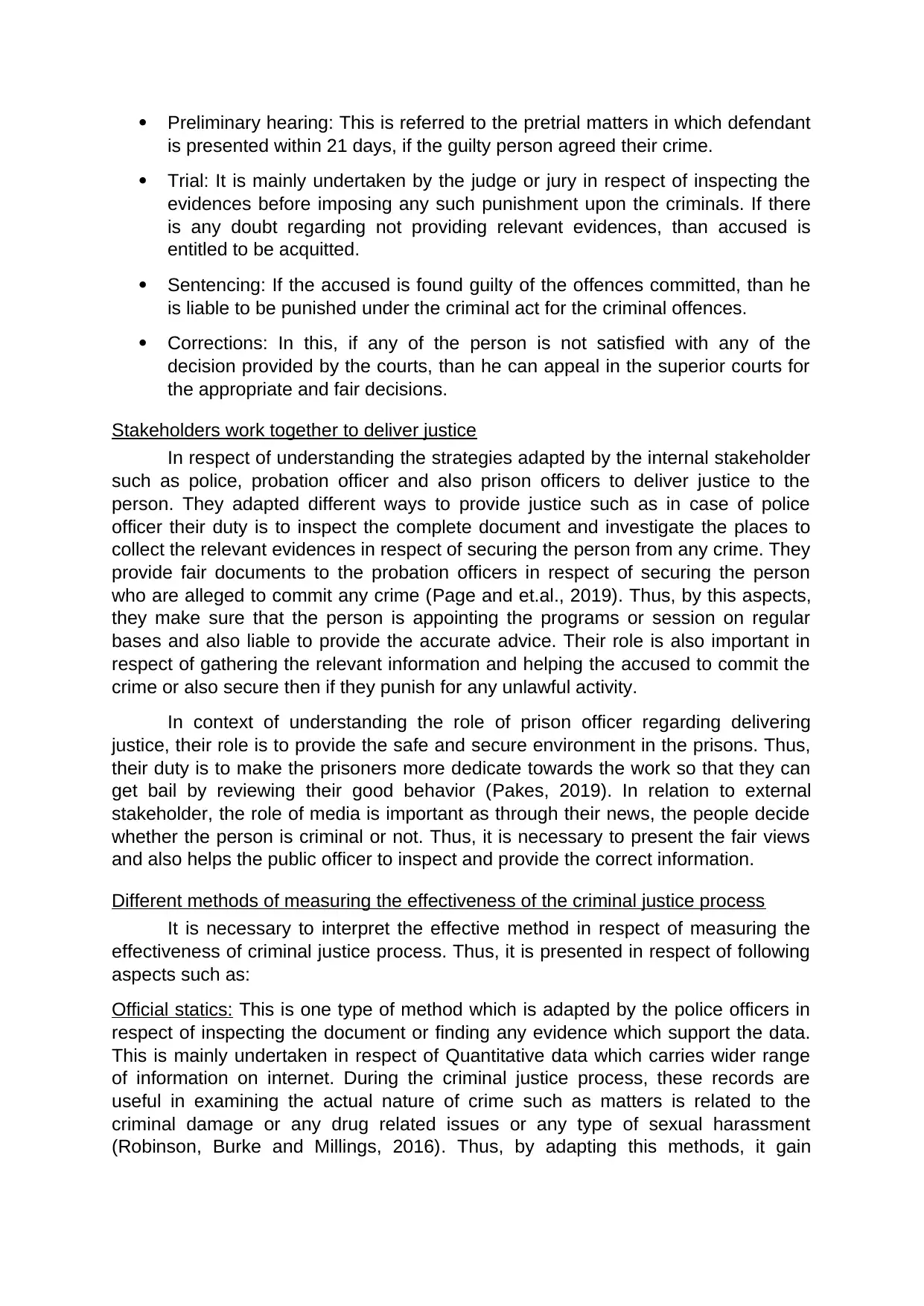
Preliminary hearing: This is referred to the pretrial matters in which defendant
is presented within 21 days, if the guilty person agreed their crime.
Trial: It is mainly undertaken by the judge or jury in respect of inspecting the
evidences before imposing any such punishment upon the criminals. If there
is any doubt regarding not providing relevant evidences, than accused is
entitled to be acquitted.
Sentencing: If the accused is found guilty of the offences committed, than he
is liable to be punished under the criminal act for the criminal offences.
Corrections: In this, if any of the person is not satisfied with any of the
decision provided by the courts, than he can appeal in the superior courts for
the appropriate and fair decisions.
Stakeholders work together to deliver justice
In respect of understanding the strategies adapted by the internal stakeholder
such as police, probation officer and also prison officers to deliver justice to the
person. They adapted different ways to provide justice such as in case of police
officer their duty is to inspect the complete document and investigate the places to
collect the relevant evidences in respect of securing the person from any crime. They
provide fair documents to the probation officers in respect of securing the person
who are alleged to commit any crime (Page and et.al., 2019). Thus, by this aspects,
they make sure that the person is appointing the programs or session on regular
bases and also liable to provide the accurate advice. Their role is also important in
respect of gathering the relevant information and helping the accused to commit the
crime or also secure then if they punish for any unlawful activity.
In context of understanding the role of prison officer regarding delivering
justice, their role is to provide the safe and secure environment in the prisons. Thus,
their duty is to make the prisoners more dedicate towards the work so that they can
get bail by reviewing their good behavior (Pakes, 2019). In relation to external
stakeholder, the role of media is important as through their news, the people decide
whether the person is criminal or not. Thus, it is necessary to present the fair views
and also helps the public officer to inspect and provide the correct information.
Different methods of measuring the effectiveness of the criminal justice process
It is necessary to interpret the effective method in respect of measuring the
effectiveness of criminal justice process. Thus, it is presented in respect of following
aspects such as:
Official statics: This is one type of method which is adapted by the police officers in
respect of inspecting the document or finding any evidence which support the data.
This is mainly undertaken in respect of Quantitative data which carries wider range
of information on internet. During the criminal justice process, these records are
useful in examining the actual nature of crime such as matters is related to the
criminal damage or any drug related issues or any type of sexual harassment
(Robinson, Burke and Millings, 2016). Thus, by adapting this methods, it gain
is presented within 21 days, if the guilty person agreed their crime.
Trial: It is mainly undertaken by the judge or jury in respect of inspecting the
evidences before imposing any such punishment upon the criminals. If there
is any doubt regarding not providing relevant evidences, than accused is
entitled to be acquitted.
Sentencing: If the accused is found guilty of the offences committed, than he
is liable to be punished under the criminal act for the criminal offences.
Corrections: In this, if any of the person is not satisfied with any of the
decision provided by the courts, than he can appeal in the superior courts for
the appropriate and fair decisions.
Stakeholders work together to deliver justice
In respect of understanding the strategies adapted by the internal stakeholder
such as police, probation officer and also prison officers to deliver justice to the
person. They adapted different ways to provide justice such as in case of police
officer their duty is to inspect the complete document and investigate the places to
collect the relevant evidences in respect of securing the person from any crime. They
provide fair documents to the probation officers in respect of securing the person
who are alleged to commit any crime (Page and et.al., 2019). Thus, by this aspects,
they make sure that the person is appointing the programs or session on regular
bases and also liable to provide the accurate advice. Their role is also important in
respect of gathering the relevant information and helping the accused to commit the
crime or also secure then if they punish for any unlawful activity.
In context of understanding the role of prison officer regarding delivering
justice, their role is to provide the safe and secure environment in the prisons. Thus,
their duty is to make the prisoners more dedicate towards the work so that they can
get bail by reviewing their good behavior (Pakes, 2019). In relation to external
stakeholder, the role of media is important as through their news, the people decide
whether the person is criminal or not. Thus, it is necessary to present the fair views
and also helps the public officer to inspect and provide the correct information.
Different methods of measuring the effectiveness of the criminal justice process
It is necessary to interpret the effective method in respect of measuring the
effectiveness of criminal justice process. Thus, it is presented in respect of following
aspects such as:
Official statics: This is one type of method which is adapted by the police officers in
respect of inspecting the document or finding any evidence which support the data.
This is mainly undertaken in respect of Quantitative data which carries wider range
of information on internet. During the criminal justice process, these records are
useful in examining the actual nature of crime such as matters is related to the
criminal damage or any drug related issues or any type of sexual harassment
(Robinson, Burke and Millings, 2016). Thus, by adapting this methods, it gain
Secure Best Marks with AI Grader
Need help grading? Try our AI Grader for instant feedback on your assignments.
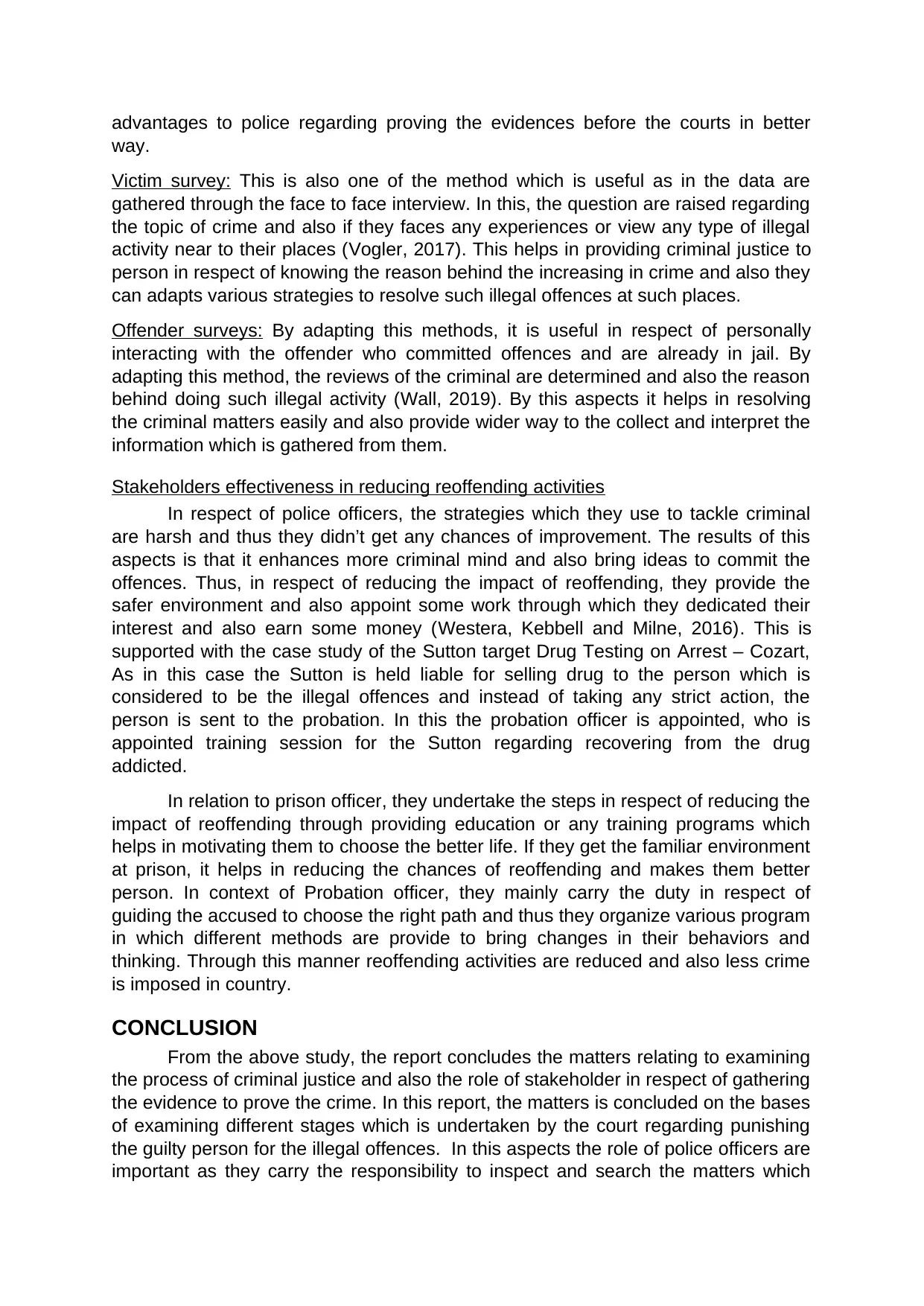
advantages to police regarding proving the evidences before the courts in better
way.
Victim survey: This is also one of the method which is useful as in the data are
gathered through the face to face interview. In this, the question are raised regarding
the topic of crime and also if they faces any experiences or view any type of illegal
activity near to their places (Vogler, 2017). This helps in providing criminal justice to
person in respect of knowing the reason behind the increasing in crime and also they
can adapts various strategies to resolve such illegal offences at such places.
Offender surveys: By adapting this methods, it is useful in respect of personally
interacting with the offender who committed offences and are already in jail. By
adapting this method, the reviews of the criminal are determined and also the reason
behind doing such illegal activity (Wall, 2019). By this aspects it helps in resolving
the criminal matters easily and also provide wider way to the collect and interpret the
information which is gathered from them.
Stakeholders effectiveness in reducing reoffending activities
In respect of police officers, the strategies which they use to tackle criminal
are harsh and thus they didn’t get any chances of improvement. The results of this
aspects is that it enhances more criminal mind and also bring ideas to commit the
offences. Thus, in respect of reducing the impact of reoffending, they provide the
safer environment and also appoint some work through which they dedicated their
interest and also earn some money (Westera, Kebbell and Milne, 2016). This is
supported with the case study of the Sutton target Drug Testing on Arrest – Cozart,
As in this case the Sutton is held liable for selling drug to the person which is
considered to be the illegal offences and instead of taking any strict action, the
person is sent to the probation. In this the probation officer is appointed, who is
appointed training session for the Sutton regarding recovering from the drug
addicted.
In relation to prison officer, they undertake the steps in respect of reducing the
impact of reoffending through providing education or any training programs which
helps in motivating them to choose the better life. If they get the familiar environment
at prison, it helps in reducing the chances of reoffending and makes them better
person. In context of Probation officer, they mainly carry the duty in respect of
guiding the accused to choose the right path and thus they organize various program
in which different methods are provide to bring changes in their behaviors and
thinking. Through this manner reoffending activities are reduced and also less crime
is imposed in country.
CONCLUSION
From the above study, the report concludes the matters relating to examining
the process of criminal justice and also the role of stakeholder in respect of gathering
the evidence to prove the crime. In this report, the matters is concluded on the bases
of examining different stages which is undertaken by the court regarding punishing
the guilty person for the illegal offences. In this aspects the role of police officers are
important as they carry the responsibility to inspect and search the matters which
way.
Victim survey: This is also one of the method which is useful as in the data are
gathered through the face to face interview. In this, the question are raised regarding
the topic of crime and also if they faces any experiences or view any type of illegal
activity near to their places (Vogler, 2017). This helps in providing criminal justice to
person in respect of knowing the reason behind the increasing in crime and also they
can adapts various strategies to resolve such illegal offences at such places.
Offender surveys: By adapting this methods, it is useful in respect of personally
interacting with the offender who committed offences and are already in jail. By
adapting this method, the reviews of the criminal are determined and also the reason
behind doing such illegal activity (Wall, 2019). By this aspects it helps in resolving
the criminal matters easily and also provide wider way to the collect and interpret the
information which is gathered from them.
Stakeholders effectiveness in reducing reoffending activities
In respect of police officers, the strategies which they use to tackle criminal
are harsh and thus they didn’t get any chances of improvement. The results of this
aspects is that it enhances more criminal mind and also bring ideas to commit the
offences. Thus, in respect of reducing the impact of reoffending, they provide the
safer environment and also appoint some work through which they dedicated their
interest and also earn some money (Westera, Kebbell and Milne, 2016). This is
supported with the case study of the Sutton target Drug Testing on Arrest – Cozart,
As in this case the Sutton is held liable for selling drug to the person which is
considered to be the illegal offences and instead of taking any strict action, the
person is sent to the probation. In this the probation officer is appointed, who is
appointed training session for the Sutton regarding recovering from the drug
addicted.
In relation to prison officer, they undertake the steps in respect of reducing the
impact of reoffending through providing education or any training programs which
helps in motivating them to choose the better life. If they get the familiar environment
at prison, it helps in reducing the chances of reoffending and makes them better
person. In context of Probation officer, they mainly carry the duty in respect of
guiding the accused to choose the right path and thus they organize various program
in which different methods are provide to bring changes in their behaviors and
thinking. Through this manner reoffending activities are reduced and also less crime
is imposed in country.
CONCLUSION
From the above study, the report concludes the matters relating to examining
the process of criminal justice and also the role of stakeholder in respect of gathering
the evidence to prove the crime. In this report, the matters is concluded on the bases
of examining different stages which is undertaken by the court regarding punishing
the guilty person for the illegal offences. In this aspects the role of police officers are
important as they carry the responsibility to inspect and search the matters which

proves the crime and also provide justice to the parties whose right are affected
through the illegal offences. It is also examined that the appropriate method are to
be undertaken in respect of resolving or reducing the reoffender to commit the
offences again. It is stated that the role of probation officer and prison officer are also
important in respect of delivering justice to the person and giving the new life to the
criminal to improve their conditions.
through the illegal offences. It is also examined that the appropriate method are to
be undertaken in respect of resolving or reducing the reoffender to commit the
offences again. It is stated that the role of probation officer and prison officer are also
important in respect of delivering justice to the person and giving the new life to the
criminal to improve their conditions.
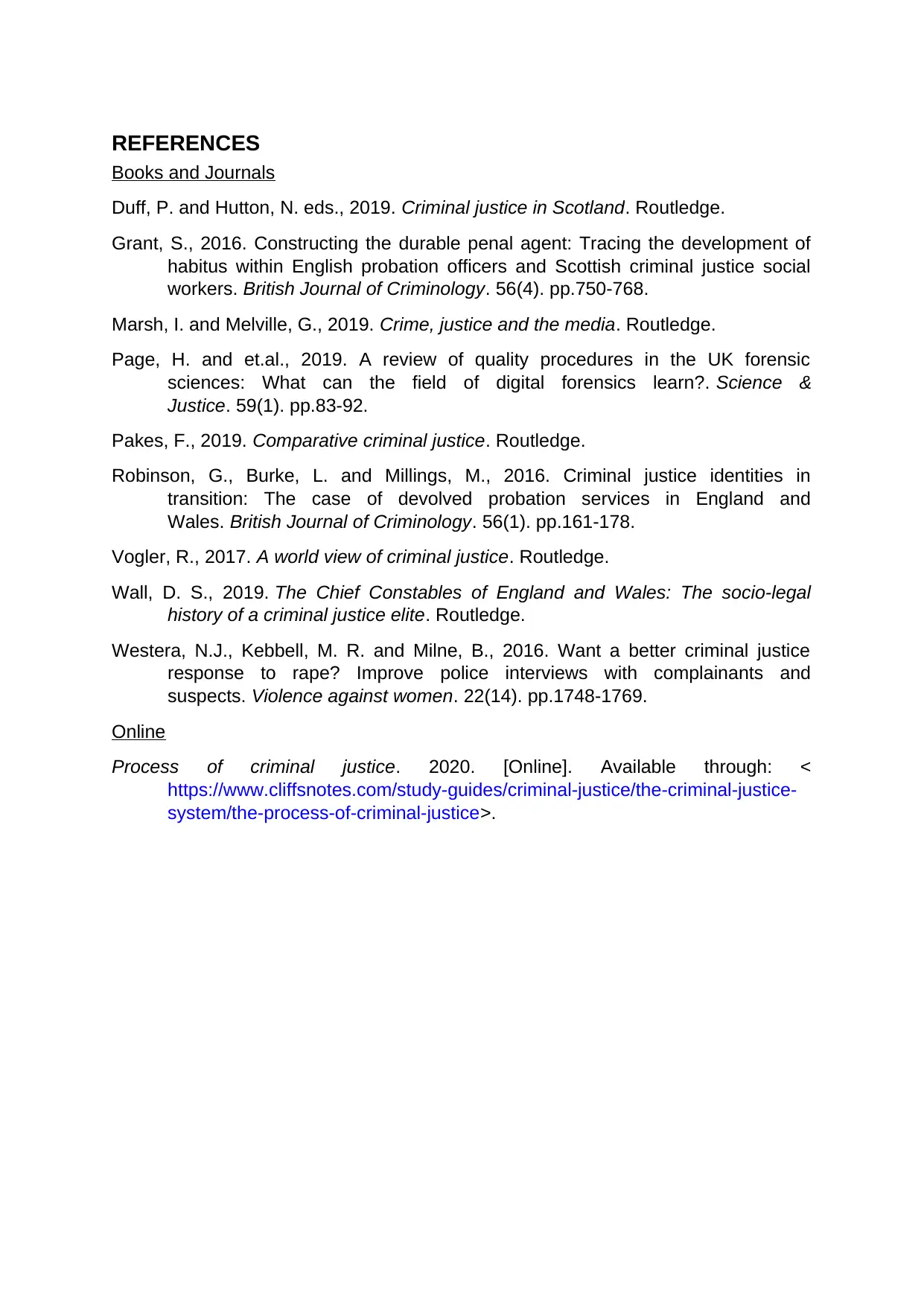
REFERENCES
Books and Journals
Duff, P. and Hutton, N. eds., 2019. Criminal justice in Scotland. Routledge.
Grant, S., 2016. Constructing the durable penal agent: Tracing the development of
habitus within English probation officers and Scottish criminal justice social
workers. British Journal of Criminology. 56(4). pp.750-768.
Marsh, I. and Melville, G., 2019. Crime, justice and the media. Routledge.
Page, H. and et.al., 2019. A review of quality procedures in the UK forensic
sciences: What can the field of digital forensics learn?. Science &
Justice. 59(1). pp.83-92.
Pakes, F., 2019. Comparative criminal justice. Routledge.
Robinson, G., Burke, L. and Millings, M., 2016. Criminal justice identities in
transition: The case of devolved probation services in England and
Wales. British Journal of Criminology. 56(1). pp.161-178.
Vogler, R., 2017. A world view of criminal justice. Routledge.
Wall, D. S., 2019. The Chief Constables of England and Wales: The socio-legal
history of a criminal justice elite. Routledge.
Westera, N.J., Kebbell, M. R. and Milne, B., 2016. Want a better criminal justice
response to rape? Improve police interviews with complainants and
suspects. Violence against women. 22(14). pp.1748-1769.
Online
Process of criminal justice. 2020. [Online]. Available through: <
https://www.cliffsnotes.com/study-guides/criminal-justice/the-criminal-justice-
system/the-process-of-criminal-justice>.
Books and Journals
Duff, P. and Hutton, N. eds., 2019. Criminal justice in Scotland. Routledge.
Grant, S., 2016. Constructing the durable penal agent: Tracing the development of
habitus within English probation officers and Scottish criminal justice social
workers. British Journal of Criminology. 56(4). pp.750-768.
Marsh, I. and Melville, G., 2019. Crime, justice and the media. Routledge.
Page, H. and et.al., 2019. A review of quality procedures in the UK forensic
sciences: What can the field of digital forensics learn?. Science &
Justice. 59(1). pp.83-92.
Pakes, F., 2019. Comparative criminal justice. Routledge.
Robinson, G., Burke, L. and Millings, M., 2016. Criminal justice identities in
transition: The case of devolved probation services in England and
Wales. British Journal of Criminology. 56(1). pp.161-178.
Vogler, R., 2017. A world view of criminal justice. Routledge.
Wall, D. S., 2019. The Chief Constables of England and Wales: The socio-legal
history of a criminal justice elite. Routledge.
Westera, N.J., Kebbell, M. R. and Milne, B., 2016. Want a better criminal justice
response to rape? Improve police interviews with complainants and
suspects. Violence against women. 22(14). pp.1748-1769.
Online
Process of criminal justice. 2020. [Online]. Available through: <
https://www.cliffsnotes.com/study-guides/criminal-justice/the-criminal-justice-
system/the-process-of-criminal-justice>.
1 out of 7
Related Documents
Your All-in-One AI-Powered Toolkit for Academic Success.
+13062052269
info@desklib.com
Available 24*7 on WhatsApp / Email
![[object Object]](/_next/static/media/star-bottom.7253800d.svg)
Unlock your academic potential
© 2024 | Zucol Services PVT LTD | All rights reserved.




